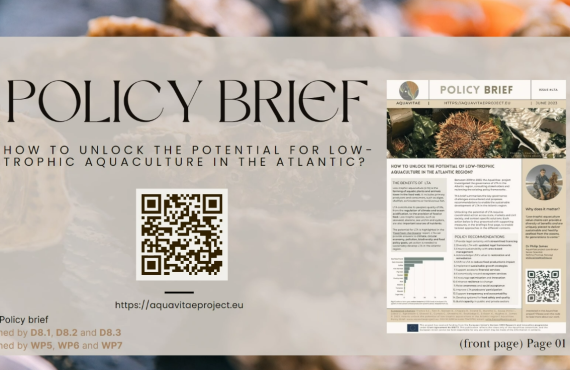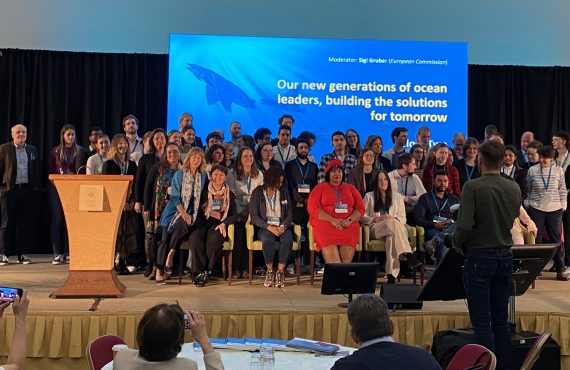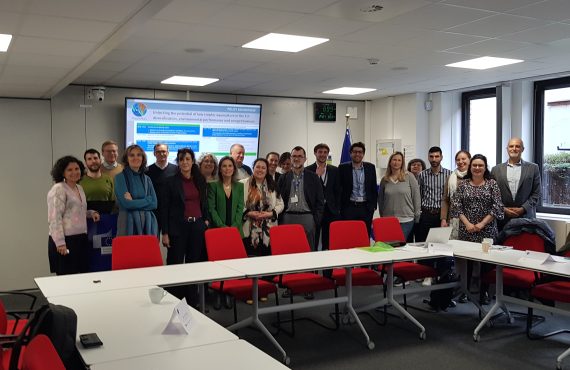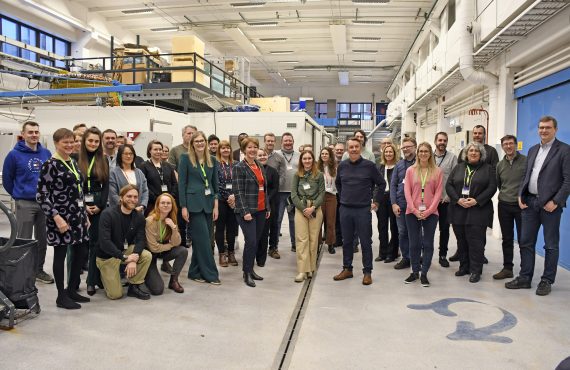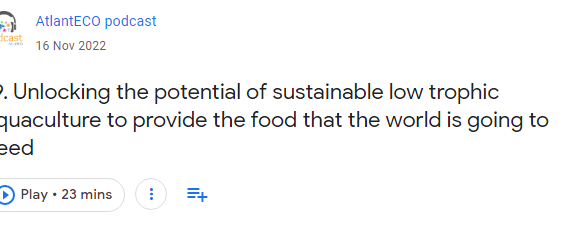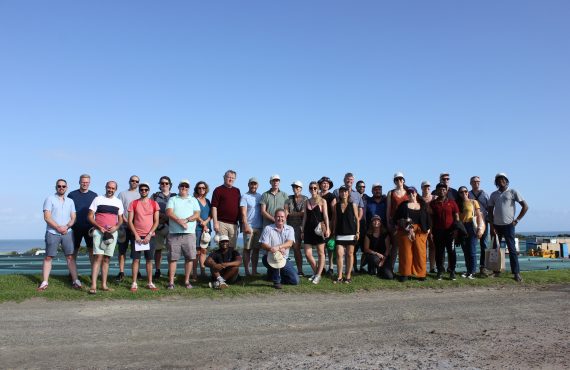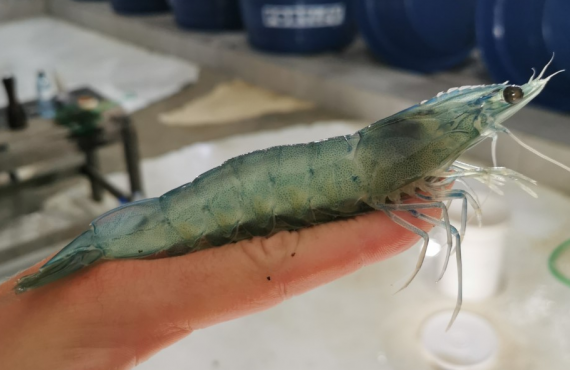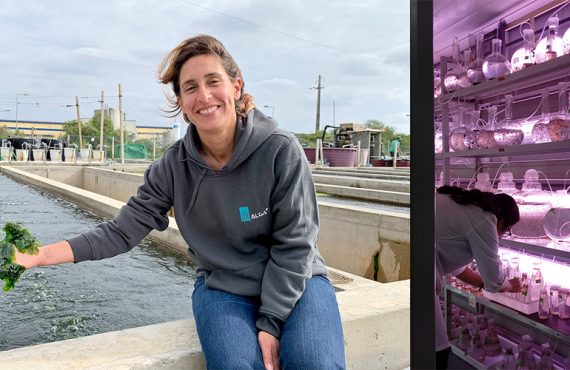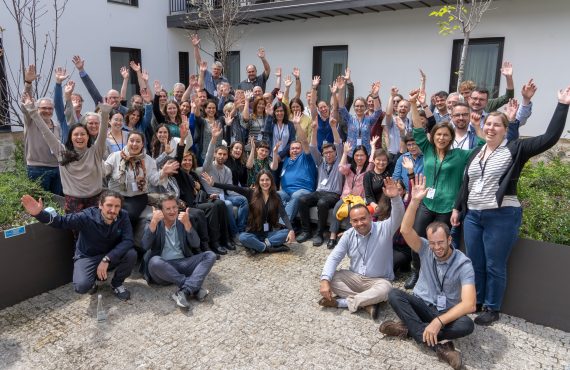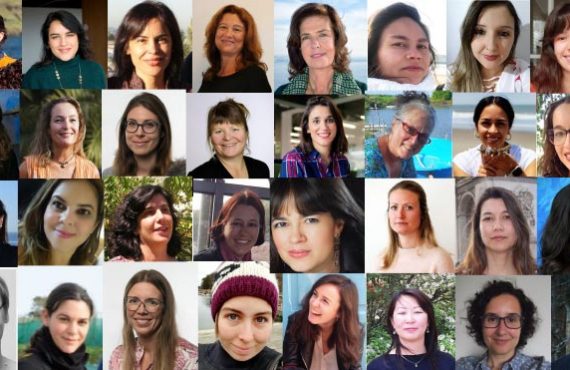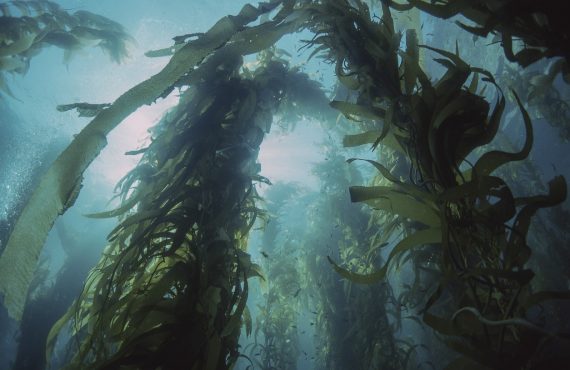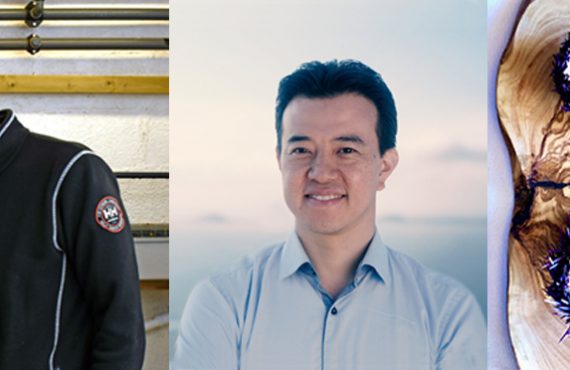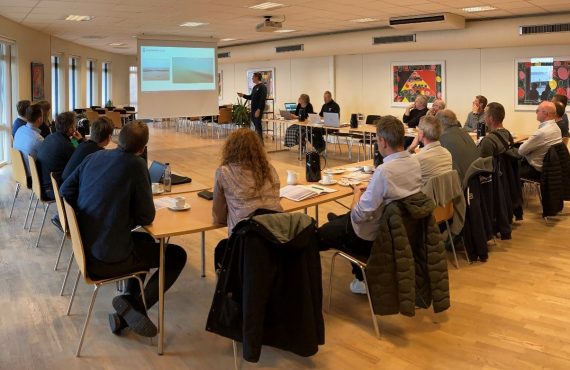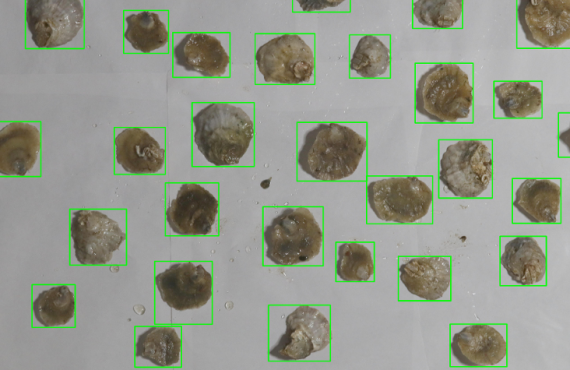AquaVitae ´s Policy Brief was officially launched to DG-MARE on April 15th. On April 15th AquaVitae held a Policy session along with DG MARE and CINEA. This final meeting gathered attendees in DG Mare premises (Brussels, Belgium) as well as online to discuss low trophic aquaculture (LTA), licensing, and regulations. After a
AquaVitae ´s Consortium in Galway, Ireland, during the Final Conference where the final results and impact of the project were presented. After four and a half years, the AquaVitae project held its Final Conference on the 31st October and 1st November in Galway, Ireland, at the Atlantic Technology University (ATU). Over
The AquaVitae Consortium warmly invite you to join us physically or online at our Final Meeting and Conference on 31st October and 1st November. The hybrid Conference event will take place in the Atlantic Technological University (ATU) facilities in Galway and can be followed online. The purpose of this final Conference is to present
AquaVitae and ASTRAL in booth 148 at EAS23 in Vienna, Austria The AquaVitae project is presenting some of its results at Europe Aquaculture, which takes place from 19-21 October in Vienna, Austria. AquaVitae is sharing stand 148 with its sister project ASTRAL. Among other results, AquaVitae will promote the MOOC (Free
All early career professionals and their mentors at the 10 years of the Galway Statement event. On Tuesday 5th July the Marine Institute, along with the Department of Foreign Affairs and the European Commission, co-hosted a high-level celebration in Iveagh House, Dublin, marking 10 years of the Galway Statement – a decade
Bio7000 by BIOLAN Sulphites are antioxidant agents widely used for extending food product´s shelf life or to maintain the colour in a wide variety of foods, such as nuts, meat or shrimp. However, sulphites are registered as allergens by the main international food safety regulatory bodies due to their potential adverse
Abalone produced at France Haliotis and tasted during AquaVitae´s presentation during the EMD2023. AquaVitae was present at European Maritime Day. The last edition of EMD was held in Brest, France, from 24th to 25th May. AquaVitae showcased the progresses and outcomes achieved in the final year of the project. Sylvain Huchette (pictured
Illustration for the SALTS MOOC: A.Kochanska, 2023. Sustainable Aquaculture for Low Trophic Species (SALTS) MOOC was officially launched at AquaVitae´s 4th annual meeting! The coordinator of the MOOC, Adrianna Kochanska (researcher at UiT, pictured in the middle), Michaela Aschan (professor at UiT, right),
AquaVitae partners in the UFSC ´s marine lab in Florianópolis, Brazil, during its 4th annual meeting. Photos: CETMAR & F. do Nascimento. The AquaVitae project held its 4th annual meeting from the 17th to 19th April in the Brazilian island of Florianópolis. The event was attended by 68 attendees, representing industry
CETMAR representing AquaVitae at AquaFuture Spain 2023. The AquaVitae partner CETMAR (Spain) attended the II International Aquaculture Fair, AQUAFUTURE SPAIN 2023, in Silleda, in Galicia, an important region for the fisheries and aquaculture sector at the northwest point of Spain. The event took place from 28th to 30th March.
AquaVitae project members joined representatives from the European Commission, advisory councils, industry and NGO´ at DG MARE, Brussels, for a policy roundtable. On March 15th, the AquaVitae policy roundtable “Unlocking the potential of low-trophic aquaculture in the EU: diversification, environmental performance and competitiveness” was held at DG MARE in Brussels, Belgium. The
AquaVitae roundtable will gathered important organizations to discuss the state of art of the low trophic aquaculture in Europe. On March 15th, 2023, the AquaVitae Consortium will hold a policy roundtable titled “Unlocking the potential of low-trophic aquaculture in the EU: diversification, environmental performance and competitiveness”. The event will take place
On the left, a green sea urchin (Strongylocentrotus droebachiensis) under normal light; on the right, excitation lighting. Note the red exudate being produced by the urchin that is not visible in normal lighting. Photos: Thomas Juhasz. By Thomas Juhasz, visiting AquaVitae PhD student at Nofima Aquaculture is a
Group picture of the network, including the mayor of Tromsø, Gunnar Wilhelmsen, in the middle. Tromsø (Norway), January 2023. Picture: Rune Stoltz Bertinussen. Sea urchins, seaweed snacks and cutting of sugar kelp during the Norwegian network launch on 25.-26. January. Nofima, together with project partners
ASTRAL & AquaVitae teams in front of their shared booth at Europe Aquaculture, Rimini, September 2022 The Belém Statement on Atlantic Research and Innovation Cooperation (2017) aims at building bridges across the Atlantic. Thus, AquaVitae has been collaborating to the Atlantic Research Community since the project began in 2019. In 2022 this
Camera and filmmaker: Rafael Méndez The AquaVitae project started in 2019. Since then, scientists and experts in different fields (from economics to policy) from 35 countries across the Atlantic work together to improve the future of aquaculture. This video showcases some of our activities and achievements. Learn how you can contribute
Wagner Valenti´s laboratory at the UNESP. AquaVitae´s partner Professor Wagner Cotroni Valenti was featured in Stanford’s List of the World’s Top Scientists. He was listed among the 2% of the most influential scientists of 2021 in the world in its relevant field. Wagner Valenti is a fellow of the World Aquaculture Society
Philip James, AquaVitae´s coordinator, featured on the AtlantECO podcast broadcasted on November 16th There are important collaborations in the framework of H2020 projects. Philip James, AquaVitae´s coordinator, featured on the AtlantECO podcast broadcasted on November 16th where he presented the project and its achievements. Do you want to listen to
Members of the AquaVitae Consortium in South Africa. Pictures by Pietro Di Modica. Thirty members of the AquaVitae consortium met face-to-face in Morgan Bay, South Africa from 15 to 18 November. At the scientific meeting participants exchanged scientific results and made plans for the final year of the project. The project
Whiteleg shrimp (Litopenaeus vannamei) – Photos: Stef Claessens By Stef Claessens, master student at the University of Algarve (Portugal) The global aquaculture production is growing immensely in all aspects and has already surpassed the output from wild caught fish and shellfish industries. Within this global aquaculture production, the
Abalone and sea urchin, the favourite species at the masterclass (pictures by Björn Suckow, AWI, and Yolanda Irawan, Cetmar)
Under the framework of the European AquaVitae project, France Haliotis organized along with the environmental organisation Ethic Ocean and
From left to right: Nolwenn Corre, chef invited to the Masterclass, and abalone (picture by Simon Cohen), one of the species cooked in the event. Aquavitae industrial partner France Haliotis organizes along with the environmental organisation Ethic Ocean and
Bas Wensveen fieldworking – Photos: Bas Wensveen By Bas Wensveen, master’s degree in Sweden at University of Gothenburg The flat oyster (Ostrea edulis) has almost completely disappeared in both natural and aquacultural environments all over Europe. The abandonment of the oyster within the aquaculture sector is mostly due to diseases and
From right to left: ALGAplus CEO, Helena Abreu, at the outdoor facilities. An employee working in the maternity room. Photos: © Alfonso Ré Lau and ALGAplus. ALGAplus is a Portuguese company that farms organic certified seaweed in a land-based facility, an alternative to wild harvesting which is still the origin of
IMTA site in in Sørvágsfjørður, Faroe Islands – Photos: Mayleen Schlund By Mayleen Schlund, student at Leibniz University Hannover Integrated-Multi-Trophic-Aquaculture (IMTA) has been implemented in aquaculture systems as a sustainable ecological approach to limit aquacultural impacts on aquatic environments. The integration of macroalgae, such as Saccharina latissima into IMTA can lead to
Speakers at AquaVitae´s workshop at EMD. From left to right: Philip James, Ólavur Gregersen, Ann Wu, Sylvain Huchette, Gercende Courtois, and Cliff Jones (online). Photo: ©AquaVitae. European Maritime Day (EMD) was celebrated in Ravenna, Italy, from 19th to 20th May. This year’s topic was Sustainable blue economy
EU Commissioner Virginijus Sinkevicius, CEO of Nofima Øyvind Fylling-Jensen, AquaVitae coordinator Philip James & sea urchins at Nofima While attending the conference Arctic Frontiers in Tromsø, EU commissioner for Environment, Oceans and Fisheries Virginijus Sinkevicius visited Nofima on the 10th of May. One of the topics discussed was
Speakers at AquaVitae´s workshop at EMD. From left to right: Ann Wu, Cliff Jones, Sylvain Huchette, Gercende Courtois, Ólavur Gregersen and Philip James (moderator of the round-table). Photo: AquaVitae European Maritime Day (EMD) is celebrated this year in Ravenna, Italy, from 19th to 20th May. This year’s
AquaVitae Consortium travelled from Europe, South Africa and Brazil to meet in Portugal. Photo: © Rafael Méndez Peña. 70 participants gathered in the third AquaVitae annual meeting that took place from April 26th to 28th in Porto, in the north of Portugal. It was the first time
From left to right up and down: seaweed, abalone, shrimp, blue mussels, oyster, sea cucumber, pirarucu and sea urchin. The AquaVitae consortium will meet in person in Porto, Portugal, where 70 project participants will join the third annual meeting of the Horizon 2020 project, in the first face-to-face annual meeting since
Nyiko Mabasa in her IMTA backyard – Photos: Nyiko Mabasa By Nyiko Mabasa, PhD researcher at Rhodes University, South Africa Aquaculture is the fastest growing food production sector globally. The sector may contribute to the sustainability of seafood harvests in the future. However, aquaculture operations produce large quantities of
A Whiteleg Shrimp (Litopeneaus vannamei) – Photos: Andressa Cristina Ramaglia da Mota By Andressa Cristina Ramaglia da Mota, PhD student at CAUNEST (Centre of Aquaculture at São Paulo State University) Aquaculture is the fastest growing food production sector in the world, accounting for over 50% of the global
Collage with women partners in AquaVitae Today we celebrate the incredible women without whom the AquaVitae project would not be possible! According to the European Commission, in 2019, women represented 23% of the workforce in the aquaculture sector, and just 3 out of 10 women are scientific researchers, says a FAO analysis. Unfortunately,
Seaweed forest in the ocean, a natural carbon sink that mitigates climate change Climate change is not something we could choose to believe in or not. It is a fact. Temperatures and the sea levels are rising, droughts are longer than usual, glaciers are shrinking, seasons are not scheduled as we
Abalone shells, a low-trophic species from the Atlantic Ocean By Ben Opara, masters’ degree in Marine Biotechnology from UIT Aquaculture is one of the fastest-growing food production sectors whose growth is expected to continue in the coming decades. However, and considering climate change, it is crucial that the sector is developed with
EATiP, ASTRAL and AquaVitae organized a side event in order to show what their collaboration might bring How can trans-Atlantic research collaboration help develop a more sustainable aquaculture industry? With this question in mind, AquaVitae, ASTRAL and EATiP organized a popular webinar which took place on the 3rd of June 2021, as a
From left to right: Philip James (coordinator of AquaVitae project), Brian Tsuyoshi Takeda (CEO and Founder of Urchinomics) and sea urchins – Photo: Nofima / Urchinomics The United Nations Decade of Ocean Science for Sustainable Development (2021-2030) recently announced that Urchinomics is to be formally endorsed as
Funchal, in the island of Madeira (Portugal) was the place where Europe Aquaculture celebrated 2021 edition By Gercende Courtois de Viçose, ULPGC, leader of the land-based IMTA case study More than 1400 participants from 57 countries met in Aquaculture Europe 21. This annual event
AquaVitae project provided some presentations and posters during Aquaculture Europe 2021 in Madeira, Portugal Once again, the European Aquaculture Society organized Aquaculture Europe. In 2021 edition Madeira, Portugal, was chosen to celebrate the event that took place last October. The island welcomed more than 1400 participants from
Mayleen Schlund, apprentice at the research station Fiskaaling, Faroe Islands – Photos: Mayleen Schlund Last summer Mayleen Schlund took part in AquaVitae training activities. The student exchange within the project framework allows the participants to expand their international networks and develop valuable transversal skills. Mayleen studies Physical Geography at the Leibniz University
Biosensor to monitore sulphite process in shrimp aquaculture – Photos: BIOLAN By Jone Garate, (PhD in Chemistry), Development and Validation Department in Biolan One of the most important challenges of food industry is to prevent contaminated products from reaching the market. Unsafe food containing bacteria, viruses or
DTU and Open Mode team over a floating connectable module – Photos: DTU and Open Mode The EMFF project OpenMode (2019-2021) has developed floating connectable modules for intensive farming in exposed areas in the Atlantic, Mediterranean, Baltic and North Sea basins. Two of the eight testers have
Blue mussel farmers, industry and NGOs joined DTU in a discussion on blue mussel production in Denmark on 26 October – Photos: DTU More than 15 stakeholders representing blue mussel farmers, industry, mangers and NGOS participated in the last AquaVitae case study meeting led by DTU and focused on aquaculture production
Oyster clasification by image analysis. Photos by Åsa Strand, IVL. By Jens Wilhelmsson, engineer at IVL. One of the most valuable bivalve molluscs in Sweden is the flat oyster, Ostrea edulis. However, domestic production of oysters fails to meet the demand on the local market at the same
Screenshot with Elisa Ravagnan – ASTRAL, Philip James – AquaVitae and David Bassett – EATiP. What are the challenges and opportunities in trans-Atlantic research collaboration and the development of a sustainable Atlantic aquaculture industry? More than 100 participants from Europe, Africa, South and North America join online to discuss the challenges and opportunities on aquaculture



